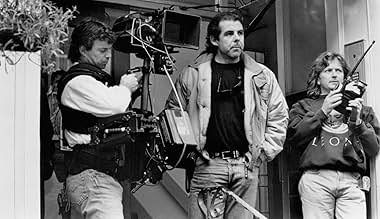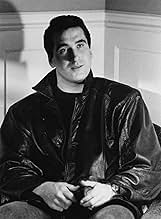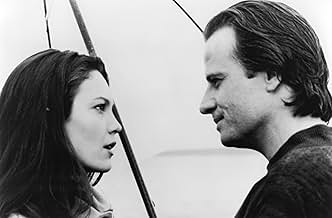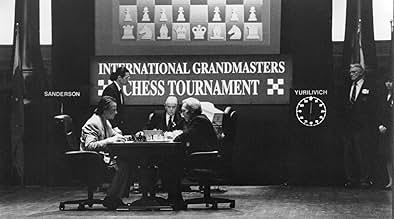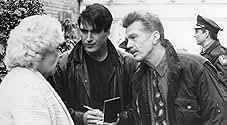CALIFICACIÓN DE IMDb
6.1/10
9.5 k
TU CALIFICACIÓN
Durante un torneo de ajedrez, se sospecha que el gran maestro Peter asesinó a Debi después de mantener relaciones sexuales con ella. Ayuda a la policía mientras continúan los asesinatos.Durante un torneo de ajedrez, se sospecha que el gran maestro Peter asesinó a Debi después de mantener relaciones sexuales con ella. Ayuda a la policía mientras continúan los asesinatos.Durante un torneo de ajedrez, se sospecha que el gran maestro Peter asesinó a Debi después de mantener relaciones sexuales con ella. Ayuda a la policía mientras continúan los asesinatos.
- Premios
- 1 premio ganado en total
Joshua Murray
- Peter 14 Years Old
- (as Josh Murray)
Ferdy Mayne
- Jeremy Edmonds
- (as Ferdinand Mayne)
Katharine Isabelle
- Erica Sanderson
- (as Katherine Isobel)
- Dirección
- Guionista
- Todo el elenco y el equipo
- Producción, taquilla y más en IMDbPro
Opiniones destacadas
Knight Moves is a film of/for fruitcakes....a little too complicated to be called a Madeira, but heavy enough to take away the hunger pangs. It manages to convey the horror of death without any real murder sequences being shown and is rather Hitchcockesque in places.
The story centres around chess player Peter Sanderson (Christophe Lambert) and his (possible) involvement in a string of serial killings. Due to his complete absorption in the game, he has already lost his wife and is now in danger of losing his daughter. Although he is the prime suspect, he becomes involved with a psychologist called in by the Police. This role was picked up by Christophe's (then) wife, Diane Lane, who not only coped well with the character, but also with a well-rehearsed bedroom scene. A case of 'truth being stranger than fiction'?
Like many of Christophe's films, this one relies heavily on explaining the psychology of the killer, even if it is only in laymen's terms; but it does deal with complex issues of responsibility and duress. The photography is a juxtaposition of European noir sur blanc and British thriller, with a little American 'home-grown' logic thrown in for good effect. Tom Skerritt is disappointing as the chief of police, a role that he plays woodenly. He is upstaged by his sidekick (Daniel Baldwin). Jeremy is portrayed by Ferdinand Mayne, an actor well known to film-going audiences, with over 120 roles to his credit before his death in 1998.
Although this film was not initially well received, its continued presence on the 'Pick of the week' shelf at the video store proves that it may well become a 'cult' film. It is often in the top-100-rentals slot in many countries and it seems to appeal to a diverse range of people. While some of the supporting cast need acting lessons, its camera work and well co-ordinated plot make this an original and enjoyable 'who-dunnit'...and you really will be guessing to the end.
The story centres around chess player Peter Sanderson (Christophe Lambert) and his (possible) involvement in a string of serial killings. Due to his complete absorption in the game, he has already lost his wife and is now in danger of losing his daughter. Although he is the prime suspect, he becomes involved with a psychologist called in by the Police. This role was picked up by Christophe's (then) wife, Diane Lane, who not only coped well with the character, but also with a well-rehearsed bedroom scene. A case of 'truth being stranger than fiction'?
Like many of Christophe's films, this one relies heavily on explaining the psychology of the killer, even if it is only in laymen's terms; but it does deal with complex issues of responsibility and duress. The photography is a juxtaposition of European noir sur blanc and British thriller, with a little American 'home-grown' logic thrown in for good effect. Tom Skerritt is disappointing as the chief of police, a role that he plays woodenly. He is upstaged by his sidekick (Daniel Baldwin). Jeremy is portrayed by Ferdinand Mayne, an actor well known to film-going audiences, with over 120 roles to his credit before his death in 1998.
Although this film was not initially well received, its continued presence on the 'Pick of the week' shelf at the video store proves that it may well become a 'cult' film. It is often in the top-100-rentals slot in many countries and it seems to appeal to a diverse range of people. While some of the supporting cast need acting lessons, its camera work and well co-ordinated plot make this an original and enjoyable 'who-dunnit'...and you really will be guessing to the end.
A psychopath uses the game of chess as a blueprint for a series of brutal murders, in this stylish 1992 film directed by Carl Schenkel. Cinematography, sound effects, scary music, and sparse dialogue combine to create an atmosphere of terror, suggestive of the "giallos" of Dario Argento.
We see the killer's black gloved hands; we see the flashlight shining in the darkened room of the next victim; we hear the killer's breathing through a mask. And in these scenes, absence of dialogue amplifies the surreal, menacing presence of the killer.
Suspense scenes alternate with scenes of mundane normalcy, which gives the viewer a chance to select the murderer from a pool of suspects whose behavior appear more or less normal. But beware; there are plenty of plot twists and false clues. The whodunit element kept me guessing and unsure; the film's suspense kept me fully engaged.
Acting quality is average. Diane Lane gives perhaps the most convincing performance of the bunch. My main criticism is the screenplay. In any murder mystery, the viewer needs enough information to have a fair chance at solving the whodunit puzzle. But in "Knight Moves", crucial details are left out. Also, several characters are poorly defined; we know almost nothing about them. Moreover, in several key scenes, the behavior of one of the main characters is not credible, given the story's underlying premise.
As a result, it's going to be almost impossible for the viewer to identify the killer, based solely on the plot. A script re-write, with more emphasis on character development, combined with the deletion of superfluous scenes would, I think, have made for a more satisfying whodunit puzzle.
Even so, I recommend "Knight Moves" as a most frightening and spine-tingling suspense thriller. For maximum effect, try watching it alone, in a mansion, at night with the lights turned out, during a thunderstorm.
We see the killer's black gloved hands; we see the flashlight shining in the darkened room of the next victim; we hear the killer's breathing through a mask. And in these scenes, absence of dialogue amplifies the surreal, menacing presence of the killer.
Suspense scenes alternate with scenes of mundane normalcy, which gives the viewer a chance to select the murderer from a pool of suspects whose behavior appear more or less normal. But beware; there are plenty of plot twists and false clues. The whodunit element kept me guessing and unsure; the film's suspense kept me fully engaged.
Acting quality is average. Diane Lane gives perhaps the most convincing performance of the bunch. My main criticism is the screenplay. In any murder mystery, the viewer needs enough information to have a fair chance at solving the whodunit puzzle. But in "Knight Moves", crucial details are left out. Also, several characters are poorly defined; we know almost nothing about them. Moreover, in several key scenes, the behavior of one of the main characters is not credible, given the story's underlying premise.
As a result, it's going to be almost impossible for the viewer to identify the killer, based solely on the plot. A script re-write, with more emphasis on character development, combined with the deletion of superfluous scenes would, I think, have made for a more satisfying whodunit puzzle.
Even so, I recommend "Knight Moves" as a most frightening and spine-tingling suspense thriller. For maximum effect, try watching it alone, in a mansion, at night with the lights turned out, during a thunderstorm.
KNIGHT MOVES
Aspect ratio: 2.39:1
Sound format: Dolby Stereo
Filmed on grim Canadian locations by German director Carl Schenkel (OUT OF ORDER), this curious psycho-thriller has the look and feel of an Italian giallo, despite the American setting. All the elements are in place: Christopher Lambert plays a chess grandmaster targeted by a serial killer who leaves obscure one-word messages at the scene of his/her crimes, hoping to draw Lambert into a lethal game of cat and mouse. That the murders are based on well-known chess manoeuvres should come as no surprise to seasoned thriller addicts, and nor should the killer's identity, which is betrayed by a seemingly throwaway bit of business near the beginning of the film (not a spoiler - only the truly attentive will spot it). Brad Mirman's convoluted script bends over backwards to cast suspicion on Lambert throughout (which means it *can't* be him - or can it?), but the narrative is undermined by some poorly-drawn characters, and everyone but Tom Skerritt - as the detective leading the investigation - seems to be coasting through proceedings on auto-pilot. The murders aren't explicitly detailed, and Schenkel goes out of his way to avoid crowd-pleasing exploitation, which rather curbs the film's commercial emphasis. But at least it's never dull, and the climax is reasonably proficient, complete with overwrought thunderstorm and psycho with a mommy complex! Daniel Baldwin exaggerates wildly as a macho cop determined to nail Lambert for the crimes, while Ferdinand Mayne hovers in the background, making the most of a glorified cameo as the hero's blind mentor.
Aspect ratio: 2.39:1
Sound format: Dolby Stereo
Filmed on grim Canadian locations by German director Carl Schenkel (OUT OF ORDER), this curious psycho-thriller has the look and feel of an Italian giallo, despite the American setting. All the elements are in place: Christopher Lambert plays a chess grandmaster targeted by a serial killer who leaves obscure one-word messages at the scene of his/her crimes, hoping to draw Lambert into a lethal game of cat and mouse. That the murders are based on well-known chess manoeuvres should come as no surprise to seasoned thriller addicts, and nor should the killer's identity, which is betrayed by a seemingly throwaway bit of business near the beginning of the film (not a spoiler - only the truly attentive will spot it). Brad Mirman's convoluted script bends over backwards to cast suspicion on Lambert throughout (which means it *can't* be him - or can it?), but the narrative is undermined by some poorly-drawn characters, and everyone but Tom Skerritt - as the detective leading the investigation - seems to be coasting through proceedings on auto-pilot. The murders aren't explicitly detailed, and Schenkel goes out of his way to avoid crowd-pleasing exploitation, which rather curbs the film's commercial emphasis. But at least it's never dull, and the climax is reasonably proficient, complete with overwrought thunderstorm and psycho with a mommy complex! Daniel Baldwin exaggerates wildly as a macho cop determined to nail Lambert for the crimes, while Ferdinand Mayne hovers in the background, making the most of a glorified cameo as the hero's blind mentor.
Some consider opening scenes about events from past, when they were children, shot in B/W as great. I don't think so. It was too long, slow(ed), over top. And worst, it made it much more predictable.
Direction was fine most of part, script, dialogs, acting not really. I blame mostly script and dialogs for seemingly bad acting. No actor which would pull it much better than Daniel Baldwin, because it was just character written as utterly stupid one. C. Lambert was OK most part, in some scenes seemed away.
Despite mentioned flaws it could be solid thriller, but last 10-15 minutes were really letdown. Extremely predictable, cliche overall, and just 'game over', the end. Still, it was watchable - I watched it on TV some 25 years ago, and now on some better display. I would give it higher rating then, now I'm more mature :-)
Ratings:
C. Lambert: 6
D. Lane: 6
Tom Skerrit: 4
Daniel Baldwin: 5
Director: 7
Script: 4
Direction was fine most of part, script, dialogs, acting not really. I blame mostly script and dialogs for seemingly bad acting. No actor which would pull it much better than Daniel Baldwin, because it was just character written as utterly stupid one. C. Lambert was OK most part, in some scenes seemed away.
Despite mentioned flaws it could be solid thriller, but last 10-15 minutes were really letdown. Extremely predictable, cliche overall, and just 'game over', the end. Still, it was watchable - I watched it on TV some 25 years ago, and now on some better display. I would give it higher rating then, now I'm more mature :-)
Ratings:
C. Lambert: 6
D. Lane: 6
Tom Skerrit: 4
Daniel Baldwin: 5
Director: 7
Script: 4
After Highlander series Lambert got an average status and promissing actor who never walk on the top, Knight Moves was an ambitious project as thriller that turn up flawed for many reasons, unrealistic, too complex, endorsed by a really bad screemplay and finally overlong, the idea to revenge through a chess game seems be insane to start, some characters likes Daniel Baldwin's behavior is incompatible with a real cop, although this neo giallo won't disappoint tatally, but the final scenes on flooded basement is too implausible, this little mistakes taken away an auspicious picture, fine and hot sexy scenes neutralize something!!
Resume:
First watch: 2019 / How many: 1 / Source: DVD / Rating: 6.5
Resume:
First watch: 2019 / How many: 1 / Source: DVD / Rating: 6.5
¿Sabías que…?
- TriviaChristopher Lambert and Diane Lane were a married couple in real life at the time and had been married since 1985, but were later divorced in 1994.
- Errores(at around 1h 35 mins) Erica is seen playing Super Mario 3 (1988) on the PC, but the game is not available on the PC. It was only released for the Nintendo Entertainment System, PlayChoice-10 and Game Boy Advance.
- Citas
David: Pain. Pain is just a state of mind. It's something you learn to live with; I have.
- Versiones alternativasThe European cut of the film runs approximately 11 minutes longer and goes into greater detail about the relationship between Peter and his dead wife. Several of the dialogue scenes also run longer. The US cut was shortened to speed up the pace and make the film more action-packed.
- ConexionesFeatures Battle Chess (1988)
- Bandas sonorasFool That I Am
Composed by Floyd Hunt (as Hunt) (Intersong USA)
Performed by Carol Kenyon
Produced by Anne Dudley
Selecciones populares
Inicia sesión para calificar y agrega a la lista de videos para obtener recomendaciones personalizadas
- How long is Knight Moves?Con tecnología de Alexa
Detalles
- Fecha de lanzamiento
- Países de origen
- Idioma
- También se conoce como
- Knight Moves
- Locaciones de filmación
- Productoras
- Ver más créditos de la compañía en IMDbPro
Taquilla
- Presupuesto
- USD 9,000,000 (estimado)
- Total en EE. UU. y Canadá
- USD 923,418
- Fin de semana de estreno en EE. UU. y Canadá
- USD 459,900
- 24 ene 1993
- Total a nivel mundial
- USD 923,418
- Tiempo de ejecución1 hora 56 minutos
- Color
- Mezcla de sonido
- Relación de aspecto
- 2.35 : 1
Contribuir a esta página
Sugiere una edición o agrega el contenido que falta

Principales brechas de datos
By what name was Juego a muerte (1992) officially released in India in English?
Responda

